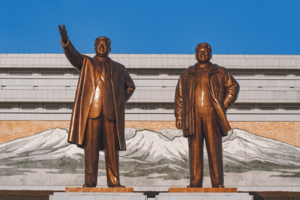Eternal leaders of North Korea facts for kids
| Eternal Leaders of North Korea | |

Bronze statues of former leaders Kim Il Sung (left) and Kim Jong Il (right) at the Mansu Hill Grand Monument
|
|
Quick facts for kids Korean name |
|
|---|---|
| Chosŏn'gŭl |
주체조선의 영원한 수령
|
| Hancha |
主體朝鮮의 永遠한 首領
|
| Revised Romanization | Juchejoseonui Yeongwonhan Suryeong |
| McCune–Reischauer | Chuch'ejosŏnŭi Yŏngwŏnhan Suryŏng |
The eternal leaders of North Korea are important past leaders of North Korea who are still honored after their deaths. This special title is mentioned in the introduction part of North Korea's main rules, called the Constitution of North Korea. It was added to the Constitution in 2016 and has been kept in later updates.
The original text says:
Under the leadership of the Workers’ Party of Korea, the Democratic People’s Republic of Korea and the Korean people will uphold the Great Leader Comrade Kim Il Sung as the eternal President of the Democratic People’s Republic of Korea and Comrade Kim Jong Il as the eternal Chairman of the National Defence Commission of the Democratic People’s Republic of Korea [...]
This means that the country and its people, guided by the Workers' Party, will always respect Kim Il Sung as the "eternal President" and Kim Jong Il as the "eternal Chairman of the National Defence Commission."
Contents
History of the Title
North Korea's First President
The job title "President of the Democratic People's Republic of Korea" was created in North Korea's Constitution in 1972. Before this, Kim Il Sung was the country's premier (like a prime minister) and the leader of the Workers' Party of Korea.
In 1972, Kim Il Sung was chosen as president by the Supreme People's Assembly, which is North Korea's law-making group. He became president on 28 December 1972. Kim Il Sung stayed president until he passed away in 1994. After his death, the position of president was left empty. His son and the next leader, Kim Jong Il, did not take on the title of president.
The "Eternal President" Title
After Kim Il Sung died, the Constitution was changed again in 1998. The new introduction said:
Under the leadership of the Workers' Party of Korea, the Democratic People's Republic of Korea and the Korean people will hold the great leader Comrade Kim Il-sung in high esteem as the eternal President of the Republic [...]
This change meant that Kim Il Sung would always be seen as the "eternal President" of North Korea, even after his death. The president was officially the head of state (the main representative of the country). However, the real power was held by the "sacred leader" of the country's main idea, called Juche.
Experts like Ashley J. Tellis and Michael Wills say that this change showed how North Korea is unique. It acts like a country where the leader is seen as almost god-like, based on a strong admiration for Kim Il Sung. North Korea also started using a special calendar called the Juche calendar, which begins in 1912, the year Kim Il Sung was born.
In 2012, the Constitution again referred to Kim Il Sung as the "eternal President of the Democratic People's Republic of Korea."
"Eternal General Secretary" and "Eternal Chairman"
After Kim Jong Il passed away, the Constitution was updated in 2012. It declared him the "Eternal General Secretary of the Workers' Party of Korea" and the "Eternal Chairman of the National Defence Commission."
Then, in 2016, the title "eternal leaders of Juche Korea" was officially added to the Constitution. This title was given to both Kim Il Sung and Kim Jong Il, honoring them as the country's forever leaders.
Leadership Roles After the Eternal Leaders
After Kim Il Sung and Kim Jong Il passed away, the jobs and powers that the president used to have were split among several different officials. These include:
- The premier of North Korea (who leads the government).
- The chairman of the Supreme People's Assembly (who leads the law-making group).
- The chairman of the Standing Committee of the Supreme People's Assembly (another important role in the law-making group).
- The head of the military, who was the chairman of the National Defence Commission (this role was replaced by the State Affairs Commission of North Korea in 2016).
- The supreme commander of the Korean People's Army (the top military leader).
Currently, these important positions are held by Kim Tok-hun, Choe Ryong-hae, and Kim Jong Un, respectively.
See also
 In Spanish: Presidente eterno de la República para niños
In Spanish: Presidente eterno de la República para niños
- Death and state funeral of Kim Il Sung
- Death and state funeral of Kim Jong Il
- Kim dynasty (North Korea)
- Kim Il Sung bibliography
- List of things named after Kim Il Sung
- North Korean cult of personality
- President for Life
- Propaganda in North Korea
- Vice President of North Korea
 | Delilah Pierce |
 | Gordon Parks |
 | Augusta Savage |
 | Charles Ethan Porter |

